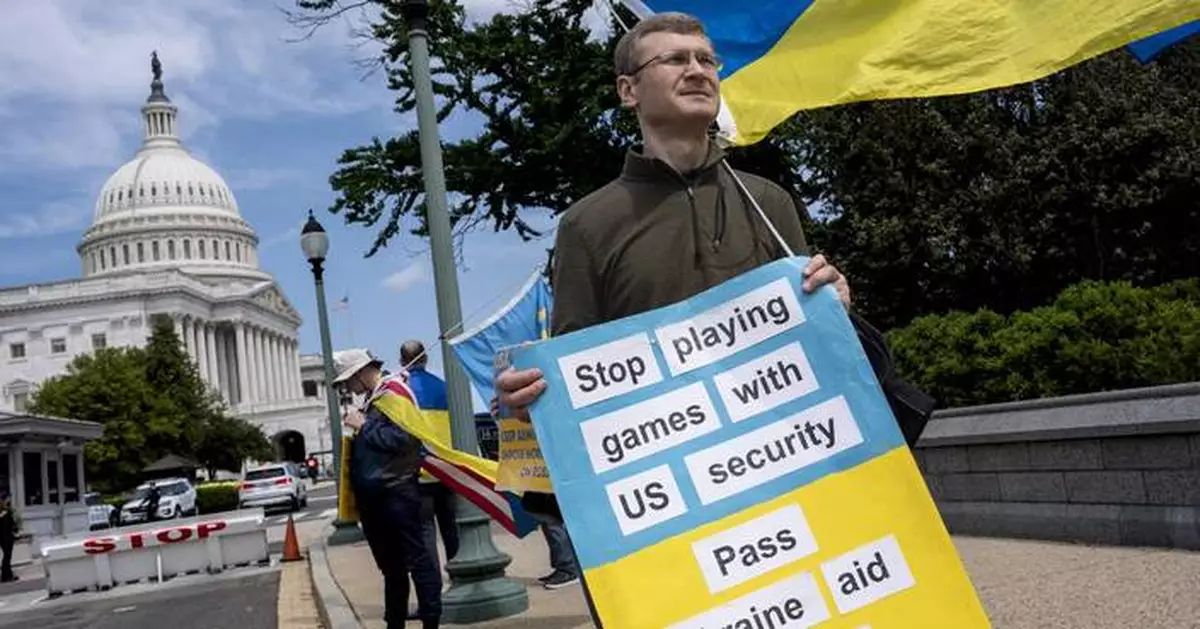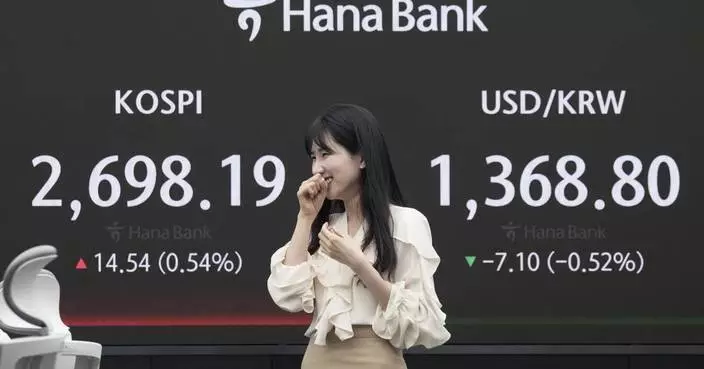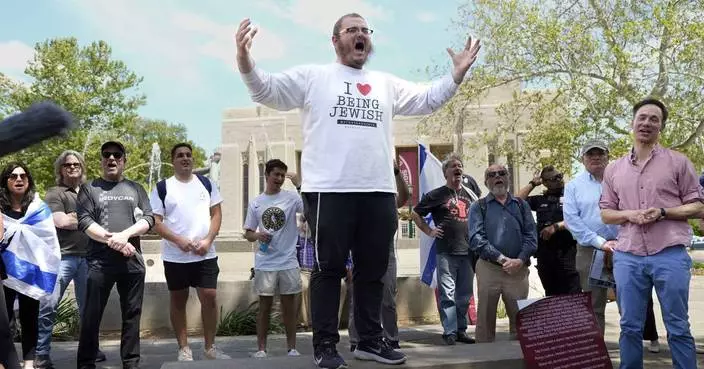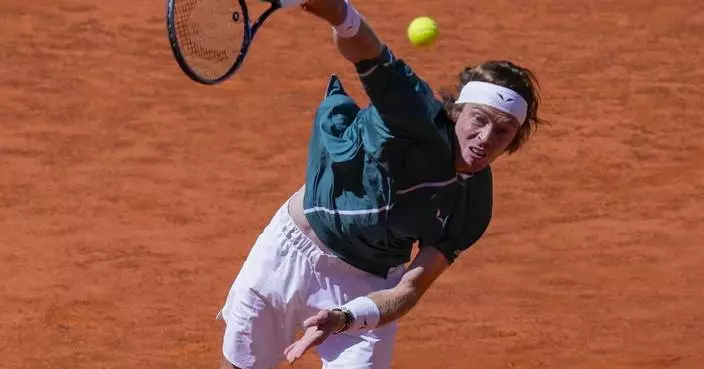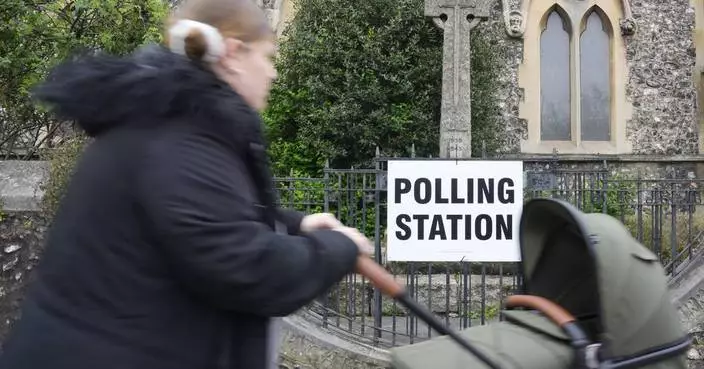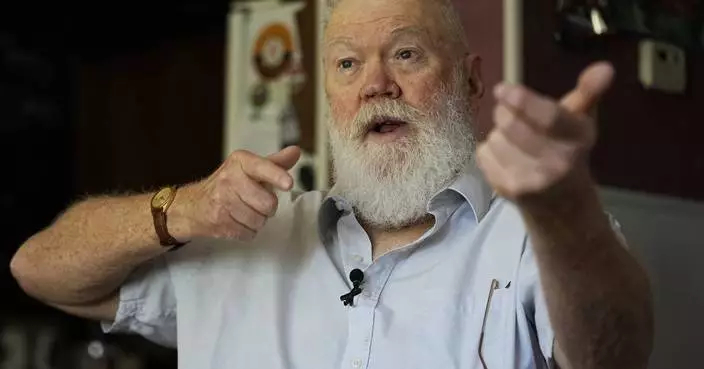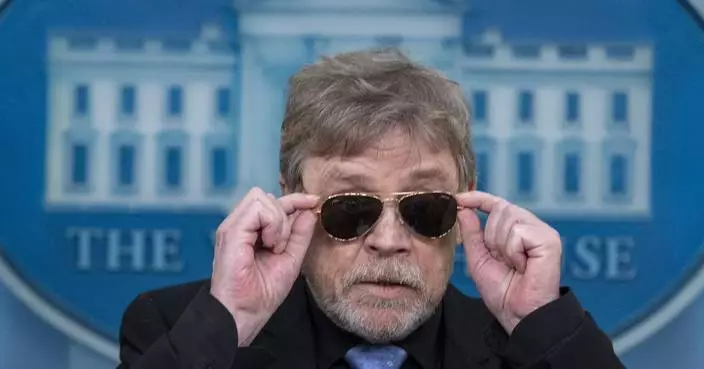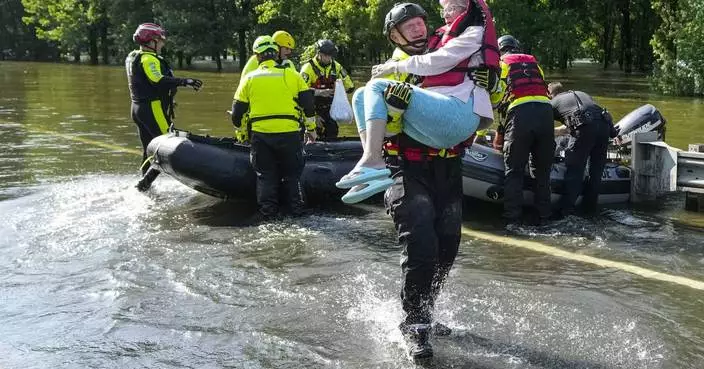WASHINGTON (AP) — The Senate voted overwhelmingly Tuesday to move ahead with $95 billion in war aid to Ukraine, Israel and Taiwan, bringing the bill to the brink of passage after months of delays and contentious internal debate over how involved the United States should be abroad.
The vote to end a filibuster drew the support of 80 senators — 10 more than supported the bill when the Senate first passed it in February -- virtually guaranteeing that the bill will soon reach President Biden’s desk. A final vote could come as soon as Tuesday evening.
The $61 billion for Ukraine comes as the war-torn country desperately needs new firepower and as Russian President Vladimir Putin has stepped up his attacks. Ukrainian soldiers have struggled to hold the front lines as Russia has seized the momentum on the battlefield and gained significant territory.
Bidentold Ukrainian President Volodymyr Zelenskyy on Monday the U.S. will send badly needed air defense weaponry as soon as the legislation is passed. The House approved the package Saturday in a series of four votes, sending it back to the Senate for final approval.
“The President has assured me that the package will be approved quickly and that it will be powerful, strengthening our air defense as well as long-range and artillery capabilities,” Zelenskyy said in a post on X.
In fact, U.S. officials said about $1 billion of the aid could be on its way shortly, the bulk following in coming weeks.
The legislation also would send $26 billion in wartime assistance to Israel and humanitarian relief to citizens of Gaza, and $8 billion to counter China in Taiwan and the Indo-Pacific. In an effort to gain more votes, Republicans in the House majority also added a bill to the package that could ban the social media app TikTok in the U.S. if its Chinese owners do not sell their stake within a year.
The foreign aid portion of the bill is similar to what the Senate passed in February with some minor changes and additions, including the TikTok bill and a stipulation that $9 billion of the economic assistance to Ukraine is in the form of “forgivable loans.”
Those changes appears to have brought nine additional Republicans on board, meaning a clear majority of the Senate GOP conference supports the legislation. The February vote on an earlier version of the bill was 70-29.
Opening the Senate Tuesday morning, Senate Majority Leader Chuck Schumer said the coming vote was “six months in the making."
“Let us not keep our friends around the world waiting for a moment longer,” Schumer said.
The package has had broad congressional support since Biden first requested the money last summer. But congressional leaders had to navigate strong opposition from a growing number of conservatives who question U.S. involvement in foreign wars and argue that Congress should be focused instead on the surge of migration at the U.S.-Mexico border.
The growing fault line in the GOP between those conservatives who are skeptical of the aid and the more traditional, “Reagan Republicans" who strongly support it may prove to be career-defining for the two top Republican leaders.
Senate GOP Leader Mitch McConnell, who has made the Ukraine aid a top priority, said last month that he would step down from leadership after becoming increasingly distanced from many in his conference on the Ukraine aid and other issues. Republican House Speaker Mike Johnson, who put the bills on the floor after praying for guidance, faces threats of an ouster after a majority of Republicans voted against the aid to Ukraine.
McConnell has made clear that stopping Putin is important enough for him to stake his political capital.
“The national security of the United States depends on the willingness of its leaders to build, sustain, and exercise hard power,” McConnell said after House passage Saturday, adding, “I make no apology for taking these linked threats seriously or for urging the Biden administration and my colleagues in Congress to do the same.”
On Tuesday morning, McConnell said the Senate faces a test, “and we must not fail it.”
Johnson said after House passage that “we did our work here, and I think history will judge it well."
South Carolina Sen. Lindsey Graham, a longtime GOP hawk who voted against it in February because it wasn’t paired with legislation to stem migration at the border, praised Johnson after the vote and indicated he will vote for it this time. “The idea that the United States will be safer if we pull the plug on our friends and allies overseas is wrong,” he said on X.
The revised House package also included several Republican priorities that were acceptable to Democrats to get the bill passed. Those include proposals that allow the U.S. to seize frozen Russian central bank assets to rebuild Ukraine; impose sanctions on Iran, Russia, China and criminal organizations that traffic fentanyl; and potentially ban TikTok in the U.S. if the owner, ByteDance Ltd., doesn’t sell. That bill has wide bipartisan support in the House and Senate.
Opponents in the Senate, like the House, are likely to include some left-wing senators who are opposed to aiding Israel as Prime Minister Benjamin Netanyahu has bombarded Gaza and killed thousands of civilians. Vermont Sens. Bernie Sanders, an independent, and Peter Welch, a Democrat, both voted against the package in February.
“This bill provides Netanyahu $10 billion more in unrestricted military aid for his horrific war against the Palestinian people,” Sanders said on X just before that vote. “That is unconscionable.”
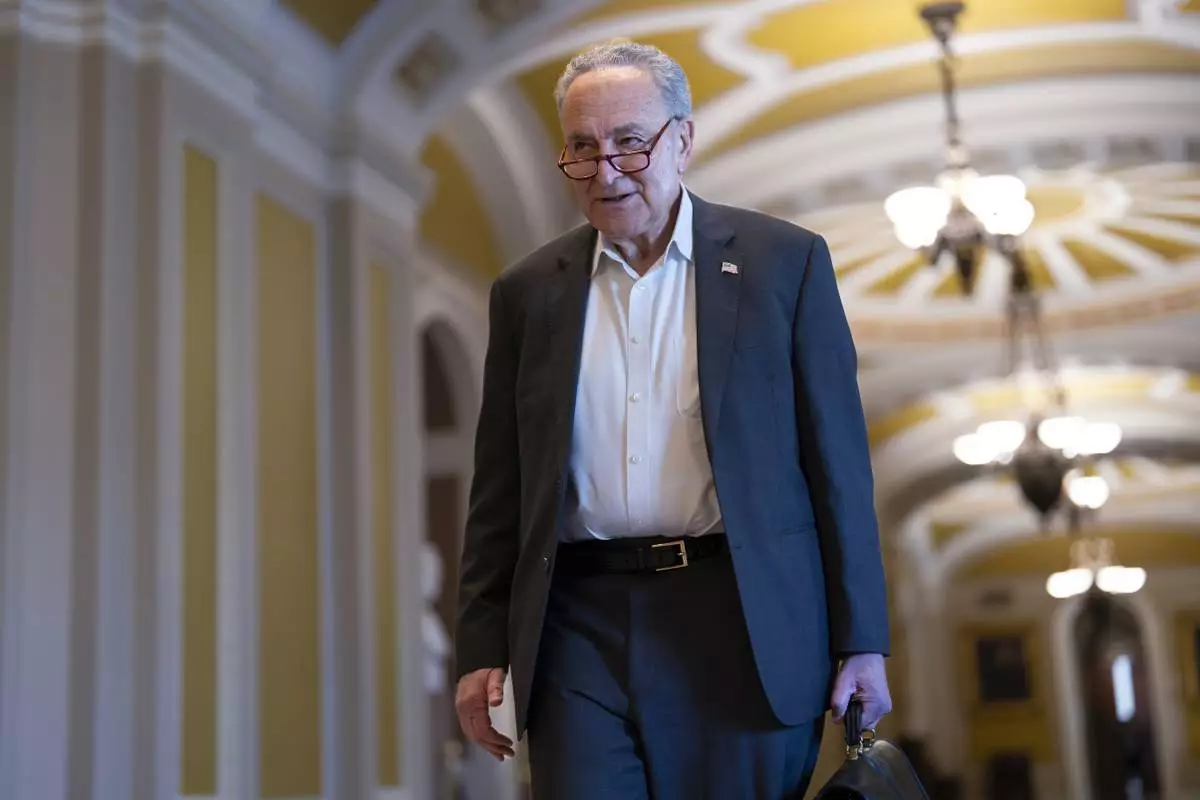
Senate Majority Leader Chuck Schumer, D-N.Y., arrives as the Senate prepares to advance the $95 billion aid package for Ukraine, Israel and Taiwan passed by the House, at the Capitol in Washington, Tuesday, April 23, 2024. (AP Photo/J. Scott Applewhite)
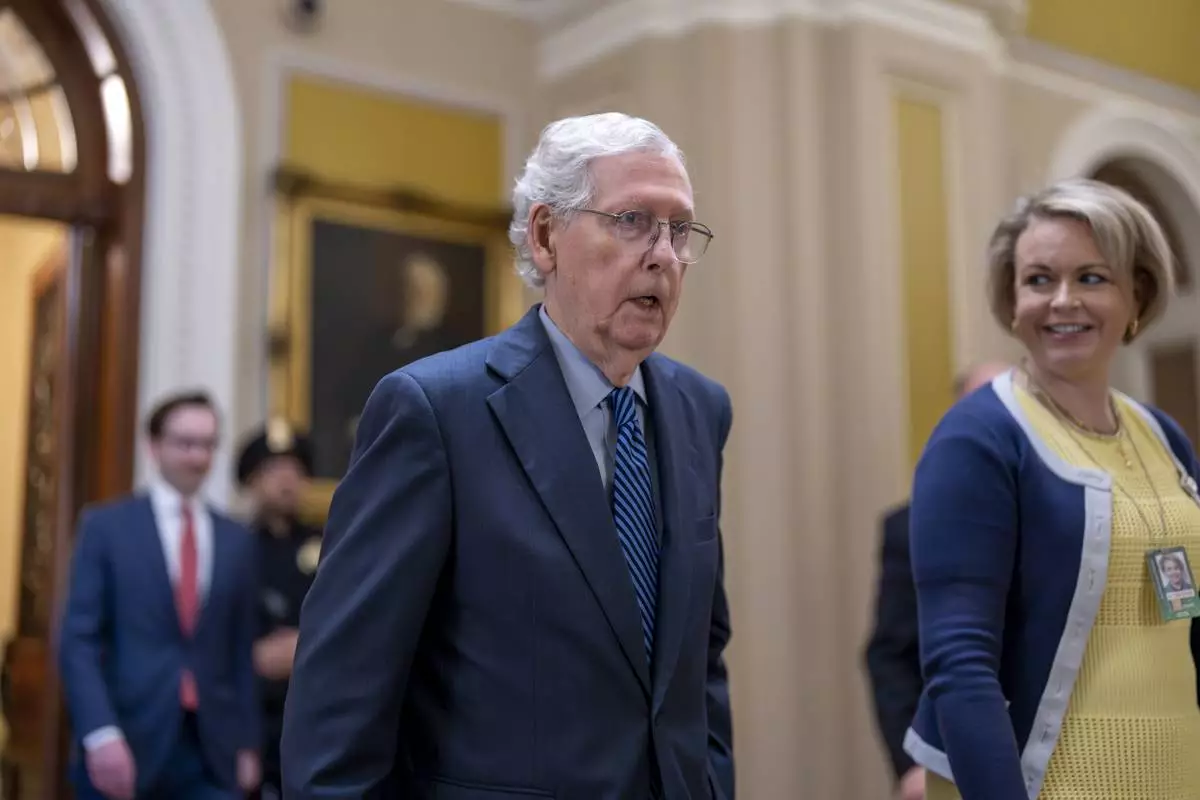
Senate Minority Leader Mitch McConnell, R-Ky., walks to his office as the Senate prepares to advance the $95 billion aid package for Ukraine, Israel and Taiwan passed by the House, at the Capitol in Washington, Tuesday, April 23, 2024. (AP Photo/J. Scott Applewhite)

FILE - Activists supporting Ukraine, demonstrate outside the Capitol in Washington, April 20, 2024. The Senate is returning to Washington to vote on $95 billion in war aid to Ukraine and Israel. They are taking the final steps in Congress to send the legislation to President Joe Biden's desk after months of delays and contentious internal debate over how involved the United States should be abroad. (AP Photo/J. Scott Applewhite)
NEW YORK (AP) — Hope Hicks took the stand Friday in Donald Trump's hush money case, recounting in her testimony how she followed Trump from the real estate world to politics and how his 2016 presidential campaign was turned upside down following a leak of a video recording in which he boasted about grabbing women without their permission.
Hicks, a former Trump adviser, was the latest witness to be called in a frenzied second week of testimony that included testimony from lawyer Keith Davidson, who represented porn actor Stormy Daniels and former Playboy model Karen McDougal in their respective hush money negotiations; forensic analyst Douglas Daus, who analyzed the contents of phones belonging to former Trump lawyer Michael Cohen; and Georgia Longstreet, a paralegal with the Manhattan district attorney's office.
Prosecutors have said that Trump and others conducted a scheme to illegally influence the 2016 election by purchasing and burying salacious stories that might hurt his campaign.
Trump is accused of falsifying internal business records to cover up hush money payments — including $130,000 given to Daniels by Cohen — recording them instead as legal expenses.
Trump has pleaded not guilty to 34 felony counts of falsifying business records.
The case is the first-ever criminal trial of a former U.S. president and the first of four prosecutions of Trump to reach a jury.
Currently:
— Donald Trump moves much of his White House campaign to New York
— Judge in Trump’s hush money case clarifies gag order doesn’t prevent ex-president from testifying
— Key players: Who’s who at Donald Trump’s hush money criminal trial
— The hush money case is just one of Trump’s legal cases. See the others here
— Trial begins for financial executive in insider trading case tied to taking Trump media firm public
Here's the latest:
Before adjourning court for the week, Judge Juan M. Merchan denied a request by prosecutors that they be allowed to ask Donald Trump, should he choose to testify, about being held in contempt of court for gag order violations in the criminal trial.
Merchan said allowing questioning on a matter involving the very same trial would be “so prejudicial it would be very, very difficult for the jury to look past that.”
Court proceedings will resume on Monday.
Hope Hicks left the witness stand Friday afternoon after Trump lawyer Emil Bove spent about 20 minutes questioning her. Bove treated the former White House communications director gingerly, calmly inquiring after she became emotional at the start of his cross-examination.
Bove used his brief questioning to underscore the defense’s contention that Michael Cohen was acting as a lone wolf, without the blessing of Donald Trump or his campaign, when he paid $130,000 to buy Stormy Daniels’ silence about her claims of a sexual encounter with Trump in 2006.
Bove elicited testimony from Hicks that Cohen sometimes went rogue in his service to Trump, that he wasn’t officially part of his campaign — though he sometimes tried to insert himself into campaign matters — and that he was known as a “fixer” only because he was “fixing things” he’d already broken.
Hicks noted that Cohen wasn’t in any of the Trump Tower meetings with Trump and campaign staff following the release of the “Access Hollywood” tape and may have been out of the country at the time.
Court adjourned for the day following Hicks' testimony.
Trump lawyer Todd Blanche indicated on Friday in comments in court that the former president is appealing the judge’s finding this week that he violated his gag order.
Blanche noted that the defense took particular issue with penalties for what are known as reposts — instances where Donald Trump shared someone else’s post with his followers.
“We’re appealing but we accept the order of the court,” Blanche said.
Trump lawyer Emil Bove returned to the day of the “Access Hollywood” tape release in his cross-examination of Hope Hicks, asking her to characterize how Donald Trump was feeling at that moment. She obliged, giving one of her longer answers of the day Friday.
“President Trump really values Mrs. Trump’s opinion and she doesn’t weigh in all the time but when she does it’s really meaningful to him,” she said. “He really, really respects what she has to say. I think he was really concerned about what the perception of this would be and yeah I know that was weighing on him.”
“I don’t think he wanted anyone in his family to be hurt or embarrassed by anything happening in the campaign,” she continued.
As she spoke, Trump appeared to nod slightly, his gaze fixed on the witness box.
Before Donald Trump’s lawyers began cross-examination of Hope Hicks, prosecutors asked her to describe what Trump said about a conversation he had with Michael Cohen in February 2018. That was right after Cohen told The New York Times that he — Cohen — had paid the $130,000 to Stormy Daniels out of his own pocket.
Hicks said Trump told her that Cohen said he “felt like it was his job to protect him and that’s what he was doing, and he did it out of the kindness of his own heart and he never told anybody about it.”
Under questioning by prosecutor Matthew Colangelo, Hicks conceded that such an act would be “out of character” for Cohen.
“I didn’t know Michael to be an especially charitable person or selfless person,” she said.
But even as Trump claimed he never knew about the payments, Hicks said, her old boss came to believe the decision to bury the story was prudent.
Judge Juan M. Merchan called a sudden recess in Donald Trump's hush money trial Friday afternoon after Hope Hicks began crying on the witness stand.
Trump lawyer Emil Bove had just begun cross-examination of her, asking her a question reflecting on her time at the Trump Organization, when she broke down.
Bove said, “Your honor, can we take a break?”
Merchan then asked Hicks if she needed time. The witness had turned away from the microphone and appeared to be breaking down in tears.
“Yes,” she said gently.
Merchan then sent the jury out of the room. Hicks left a moment later, still emotional as she slipped out a side door.
Hope Hicks testified Friday that she spoke with Donald Trump on Nov. 5, 2016, the day after the Wall Street Journal article on Karen McDougal's hush money deal was published.
She said that he “was concerned about the story. He was concerned about how it would be viewed by his wife, and he wanted me to make sure the newspapers weren’t delivered to their residence that morning.”
Asked if Trump was also worried about the story’s impact on his campaign, Hicks testified that everything they spoke about during the time was viewed through the lens of the campaign, with Trump often asking her, “How is it playing?” as a way of gauging how his appearances, speeches and policies were landing with voters.
Hicks testified that she was almost certain that Trump used the phrase to express concern about how the Journal story would affect his election chances and the final days of his campaign.
Hope Hicks was asked Friday about text messages she exchanged with Michael Cohen immediately after the publication of The Wall Street Journal’s story about the National Enquirer’s parent company buying the rights to Karen McDougal’s story.
One message, displayed for jurors, showed Hicks requesting Cohen share a phone number for David Pecker, the president of parent company American Media Inc. “Mr. Trump wanted to speak with him,” she testified.
In another message, Cohen informs Hicks he has a “statement by Storm denying everything and contradicting the other porn stars.” Hicks testified she didn’t know what Cohen was referring to “and I didn’t want to know.”
Both Cohen and Hicks were initially pleased by what Hicks described as a “muted” reaction to the Journal story.
“It wasn’t being picked up in the same way that something like the ‘Access Hollywood’ tape was,” she said. “It wasn’t wall-to-wall coverage.”
Hope Hicks resumed testifying after a lunch break, with a prosecutor focusing his questions on the Trump campaign’s response to a Wall Street Journal story published days before Election Day in 2016 that exposed the National Enquirer’s $150,000 catch-and-kill deal with Karen McDougal.
Hicks testified that Donald Trump requested that she convey to the Journal reporter who reached out for comment that he denied McDougal's claims of an affair and porn actor Stormy Daniels' claims of a sexual encounter, which were also mentioned in the article.
As is standard practice, The Wall Street Journal contacted Hicks before publication of the article and included Hicks’ statement in the story.
She read a portion of her denial, as printed in the Journal, on the witness stand: “Hope Hicks, a Trump campaign spokeswoman, said of the agreement with Ms. McDougal: ‘We have no knowledge of any of this.’”
Hicks recalled that Trump and Michael Cohen spoke by phone after the story was published, but that nothing stood out from the call. She remembered Trump being on the call while in a car traveling from an airport to a campaign event in Pennsylvania.
“I don’t remember anything that was said,” Hicks testified.
Before Friday's lunch break in Donald Trump's criminal trial, Hope Hicks testified that after striking out with Jared Kushner in her bid to have the Wall Street Journal's story about American Media Inc. buying the rights to Karen McDougal’s story, she called Michael Cohen and then David Pecker.
Hicks testified that she didn’t really remember what Cohen said to her, but “there was a reason I called David next.”
“I think Michael sort of feigned like he didn’t know what I was talking about and that we should connect with David to get more information,” Hicks testified.
Asked about her conversation with Pecker, Hicks said she “asked what was going on, why was I receiving this email?” — referring to the request for comment she’d received from the Journal reporter.
“He explained that Karen McDougal was paid for magazine covers and fitness columns and that it was all very legitimate and that’s what the contract was for,” Hicks testified.
Hope Hicks testified Friday that she asked Jared Kushner to try to delay publication of a story involving Donald Trump and former Playboy model Karen McDougal.
Hicks said that four days before the November 2016 election, she received a request for comment from a Wall Street Journal reporter for a forthcoming story about American Media Inc. buying the rights to McDougal’s story that she had an affair with Trump years earlier.
Immediately, Hicks testified, she reached out to Kushner — in hopes he could use his connections to Rupert Murdoch, the owner of the Journal’s parent company, News Corp., to help delay the story.
“He had a very good relationship with Rupert Murdoch and I was hoping to see if we could buy a little extra time to deal with this,” she said of Kushner.
Kushner, Trump’s son-in-law, told her that he likely wouldn’t be able to reach Murdoch in time, Hicks testified.
Hope Hicks testified Friday that she first heard Stormy Daniels' name uttered on Donald Trump's plane about a year before Michael Cohen struck a deal with the porn actor to silence her claims of a sexual encounter with Trump years earlier.
In November 2015, Hicks said, she heard Trump and some of his security detail “telling a story about a celebrity golf tournament and some of the participants in the tournament and her name came up.”
The way the story went, Daniels “was there with one of the other participants that Mr. Trump played with that day,” Hicks testified.
In the final weeks of Trump’s 2016 campaign, Cohen paid Daniels $130,000 to keep quiet about what she says was an awkward and unexpected sexual encounter with Trump at a celebrity golf outing in Lake Tahoe in July 2006.
Trump denies having sex with Daniels.
In the aftermath of the “Access Hollywood” tape’s release, Hicks testified Friday that she asked Michael Cohen, then a lawyer for Donald Trump, to chase down a rumor about another potentially damaging tape.
Hicks said she wanted to be proactive in seeking out the supposed tape because “I did not want anyone to be blindsided.”
She asked Cohen to call a friend of his in the media — whom she did not identify — and ask about the existence of the tape and, if there was a tape, when the campaign could expect it to be published.
“There was no such tape regardless, but he sort of chased that down for me,” Hicks said.
Former Trump adviser Hope Hicks testified on Friday that the political firestorm that ensued after the release of the “Access Hollywood” tape was so strong, it knocked an actual storm out of the headlines.
“It was intense. It dominated coverage, I would say, for the 36 hours leading up to the debate,” she said, referring to an important debate with Democrat Hillary Clinton that Donald Trump had been preparing for when the news broke.
Hicks said that at the time she received an email from a Washington Post reporter around 1:30 p.m. on Oct. 7, 2016, informing her of the looming publication of a story revealing the tape, the news was dominated by a Category 4 hurricane that was charging toward the east coast.
“I don’t think anybody remembers” where that hurricane hit, Hicks said.
Hurricane Matthew, which had hit Haiti and Cuba as a Category 4 storm earlier in the week, made landfall in the U.S. in South Carolina as a Category 1 hurricane on Oct. 8, the day after the tape was made public.
Hicks also testified that Trump's initial opinion on the tape's leak was that he felt “this wasn’t good, but it was also like two guys talking privately, locker room talk.”
“It wasn’t anything to get so upset over,” she said of Trump’s feelings. “Certainly he didn’t want to upset anybody. He felt like this was pretty standard stuff for two guys chatting with each other.”
Prosecutors in Donald Trump's hush money case read through a series of statements on Friday put out by prominent Republicans — including U.S. Sens. John McCain and Mitt Romney — in response to the “Access Hollywood” tape, asking Hicks whether she recalled the various condemnations.
She appeared increasingly irritated by the line of questioning as it went on.
Asked about remarks from then-Speaker of the House Paul Ryan calling the tape “sickening,” Hicks replied tersely: “I don’t remember that but it sounds like something he would say.”
Jurors in Donald Trump's hush money case saw on Friday a transcript in court of the infamous “Access Hollywood” tape, as prosecutors asked Hicks to describe her reaction to learning about the tape’s existence from a reporter seeking comment.
“I was concerned, very concerned,” Hicks said, speaking slowly. “Yeah. I was concerned about the contents of the email. I was concerned about the lack of time to respond. I was concerned that we had a transcript but not the tape. There was a lot at play.”
Hicks said she forwarded the request to other campaign leadership, including Steve Bannon and Kellyanne Conway, with the recommendation to “deny, deny, deny.”
The transcript of the conversation, which was attached in an email from a Washington Post reporter, was not read aloud in court but was shown on monitors visible to jurors. Hicks was asked to read portions of the transcript to herself before responding.
Trump sat stone-faced as the transcript appeared on screen, whispering at points to his lawyers.
Hope Hicks testified Friday that she doesn’t remember if she was involved in the August 2015 meeting where David Pecker, then publisher of the National Enquirer, said he told Donald Trump and Michael Cohen he’d be the “eyes and ears” of Trump’s 2016 presidential campaign.
“I don’t have a recollection of that, but it’s certainly possible,” Hicks said.
Pecker testified last week that Hicks was present for some of the meeting, and Hicks said Friday that she’d frequently pop in and out of Trump’s office while he was meeting with other people.
Hicks recalled some of Trump’s other interactions with Pecker, including phone calls in which the then-candidate praised the publisher for articles critical of his political rivals.
She testified that she had a “vivid recollection” of hearing Trump on the phone with Pecker congratulating him on a National Enquirer article about medical malpractice allegations against Dr. Ben Carson. Another time, Trump called Pecker to compliment a negative article about U.S. Sen. Ted Cruz.
Before Hope Hicks took the stand on Friday, the court saw and heard some of Donald Trump’s responses to the release of the “Access Hollywood” tape in October 2016.
They included a video he posted to Twitter, now known as the social platform X, in which he apologized and called the video a “distraction from important issues we face today,” and a tweet in which he called his comments in the 2005 video “locker room remarks.”
Jurors also heard about a March 2023 Truth Social post in which Trump said he “did nothing wrong” and included a derogatory nickname for Stormy Daniels. In the post, he referred to Michael Cohen, his ex-lawyer, as a “convicted liar and felon jailbird” and stated: “Never had an affair with her. Just another false acquisition by a sleazebag.”
In another social media post, he maintained “Nothing ever happened with these women” and “No one has more respect for women than me.”
Prosecutor Matthew Colangelo used the start of Hope Hicks’ testimony Friday to give jurors a window into Donald Trump’s real estate company, the Trump Organization, including its personnel and even the physical layout of its offices.
Colangelo also quizzed her on other Trump Organization figures, including Trump’s longtime bodyguard Keith Schiller, his former executive assistant Rhona Graff, ex-chief financial officer Allen Weisselberg and ex-lawyer turned key trial figure Michael Cohen. He also asked her to describe what she meant by the “26th floor,” the section of Trump Tower where Trump and other executives had their offices.
Hicks also described the sudden transition from working for the Trump Organization to working for Trump’s presidential campaign.
“Mr. Trump one day said we’re going to Iowa and I didn’t really know why,” Hicks recalled.
When Trump later said she would be his press secretary, Hicks said her first thought was that he “might be joking.”
“I had no experience and worked at the company, not the campaign, so I didn’t take it very seriously,” she said. “Eventually I started spending so much time on the campaign that I became a member of the campaign and I was the press secretary.”
After taking the stand in Donald Trump's hush money trial Friday morning, Hope Hicks spoke about the former president in glowing terms, complimenting him multiple times in the first few minutes of her testimony.
She described him as a “very good multi-tasker, a very hard worker.”
Asked by prosecutor Matthew Colangelo who she reported to while working as communications director for the Trump Organization, Hicks said, “Everybody that works there in some sense reports to Mr. Trump. It’s a big successful company but it’s really run like a small family business in some ways.”
Hicks, who currently has her own communications consulting firm, is testifying under a subpoena and, unlike other former Trump employees, is paying her lawyers herself.
Hope Hicks, who served as Donald Trump’s 2016 campaign press secretary and went on to hold various roles in his White House, took the witness stand in his New York hush money case on Friday.
Her testimony on the trial’s 11th day was the latest in a frenzied second week of witness testimony and followed that of forensic analyst Douglas Daus and paralegal Georgia Longstreet.
Donald Trump has paid his $9,000 fine for violating the gag order in his hush money criminal trial.
The former president paid the penalty Thursday, ahead of a Friday deadline. Trump’s legal team supplied the court clerk’s office with two cashier’s checks — one for $2,000 and one for $7,000.
Judge Juan M. Merchan ordered Trump to pay the fine after holding him in contempt of court and finding that posts he made online about his ex-lawyer Michael Cohen, porn actor Stormy Daniels and the composition of the jury had violated the gag order.
Merchan is currently weighing a prosecution request to hold Trump in contempt again and fine him $1,000 for each of four more alleged violations from last week. Merchan has warned Trump that he could be jailed if he keeps breaching the gag order.
A government agency at the heart of Donald Trump’s separate classified documents criminal case got a name drop at his New York hush money trial on Friday.
Georiga Longstreet testified that she used the National Archives and Records Administration’s archive of the official presidential account on Twitter, now known as the social platform X, to help verify the authenticity of Trump’s account.
Longstreet noted that Trump’s official government account, @POTUS45, frequently reposted posts from Trump’s @realdonaldtrump account.
There was no visible reaction from Trump to the mention of the National Archives, whose pursuit of records he took from the White House to his Mar-a-Lago estate in Florida after his 2020 election loss led to charges alleging that he illegally hoarded classified documents.
Georgia Longstreet, a paralegal with the Manhattan district attorney's office, was called as the next witness in Donald Trump's hush money case on Friday.
She has been assigned to the Trump case for the past year and a half and her role has been to review publicly available records relevant to the case, including Trump’s social media accounts on the social platform X — formerly known as Twitter — Facebook, LinkedIn and Truth Social.
Picking up where he left off on Thursday, Trump attorney Emil Bove plied Douglas Daus, the forensic analyst, with a set of deeply technical questions Friday meant to suggest that Michael Cohen may have doctored a 2016 recording played in court the previous day.
As evidence, Bove noted that the audio cuts off suddenly, as well as “gaps” in the handling of the phone that Daus agreed were “not ideal.”
Prosecutors say the abrupt ending of the recording was the result of Cohen receiving another call. Under questioning from Bove, Daus said there was no record of an incoming call in the phone’s metadata — but said it would be difficult to say for sure without looking at call log data from Cohen’s phone carrier.
“In many ways, we’re just going to have to take Michael Cohen’s word for it, aren’t we?” Bove said.
“Yes,” Daus replied.
With that, Bove concluded his cross-examination.
Before testimony resumed in Donald Trump's hush money trial, Judge Juan M. Merchan ruled to prevent prosecutors from showing the jury a photograph of Trump with Billy Bush and soap opera actor Arianne Zucker at the time of the infamous “Access Hollywood” recording.
Trump lawyer Todd Blanche had asked for the image to be excluded from the trial, pointing to a recent court decision overturning Harvey Weinstein’s rape conviction. In that case, the appeals court ordered a retrial because the judge had allowed testimony at trial unrelated to the allegations.
Merchan said the appeals court decision “doesn’t really factor into this” case, noting that the ruling had not laid out any new law, but nevertheless agreed to block prosecutors from introducing the photograph.
Prosecutors had said the image would help establish the timeline of the revelations about the “Access Hollywood” tape, in which Trump could be heard bragging about grabbing women without permission.
Merchan has previously ruled the 2005 tape cannot be played in court for jurors, but said prosecutors can still question witnesses about the recording.
Judge Juan M. Merchan started the trial day also by clarifying that Donald Trump’s gag order doesn’t prohibit him from testifying on his own behalf, apparently responding to comments the former president made after court the day before.
“The order restricting extrajudicial statements does not prevent you from testifying in any way,” Merchan said, adding that the order does not in any way limit what Trump says on the witness stand.
Merchan directed his comments to Trump and his lawyers, saying it had come to his attention that there may have been a “misunderstanding” regarding the order.
Speaking to reporters before heading into court on Friday, Donald Trump clarified comments he made the day before about his gag order, saying it does not stop him from testifying in the case but it does keep him from “talking about people and responding when they say things about me.”
After court adjourned on Thursday, Trump had responded to questions about what he’d thought of the day’s testimony.
“I’m not allowed to testify. I’m under a gag order,” he said, causing some confusion. The gag order bars him from making public statements about witnesses, jurors and some others connected to the case.
He also commented on the latest job numbers showing that U.S. employers scaled back hiring in April and said they’re “horrible.”
Donald Trump has arrived at the courthouse in Manhattan for the 11th day of his hush money trial.
The introduction has been updated to correct the spelling of the last name of forensic analyst Douglas Daus, from Daul.

Former President Donald Trump arrives at Manhattan criminal court in New York, on Friday, May 3, 2024. (Charly Triballeau/Pool Photo via AP)

Former President Donald Trump appears at Manhattan criminal court before his trial in New York, Friday, May 3, 2024. (Jeenah Moon/Pool Photo via AP)

Former President Donald Trump arrives at Manhattan criminal court in New York, on Friday, May 3, 2024. (Doug Mills/The New York Times via AP, Pool)

Former President Donald Trump appears at Manhattan criminal court before his trial in New York, Friday,, May 3, 2024. (Doug Mills/The New York Times via AP, Pool)

Former President Donald Trump appears at Manhattan criminal court before his trial in New York, Friday,, May 3, 2024. (Jeenah Moon/Pool Photo via AP)

Former President Donald Trump appears at Manhattan criminal court before his trial in New York, Friday,, May 3, 2024. (Jeenah Moon/Pool Photo via AP)

Former President Donald Trump arrives at Manhattan criminal court before his trial in New York, Thursday, May 2, 2024. (Charly Triballeau/Pool Photo via AP)

Former President Donald Trump sits inside Manhattan Criminal Court, Thursday, May 2 2024. (Mark Peterson/Pool Photo via AP)

Former President Donald Trump arrives at Manhattan criminal court before his trial in New York, Thursday, May 2, 2024. (Charly Triballeau/Pool Photo via AP)





